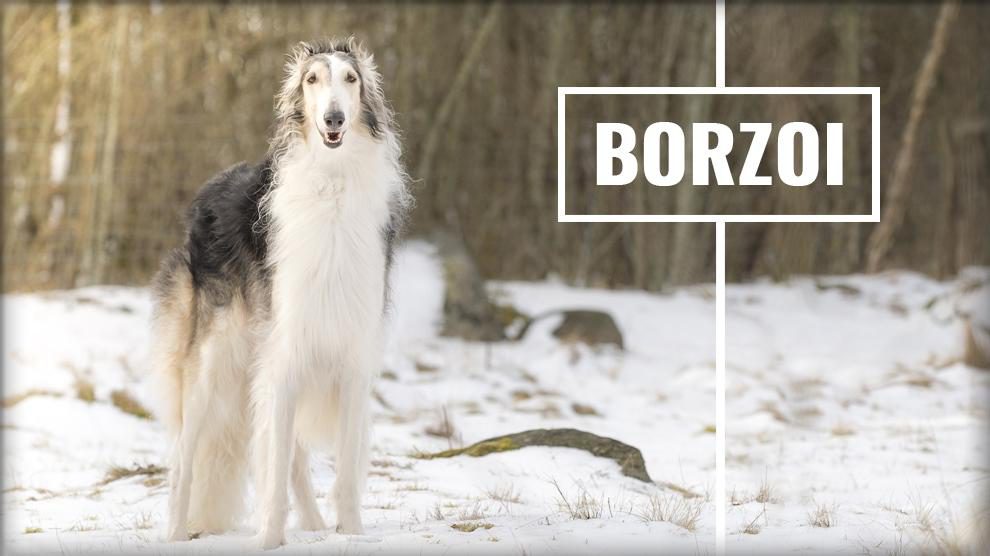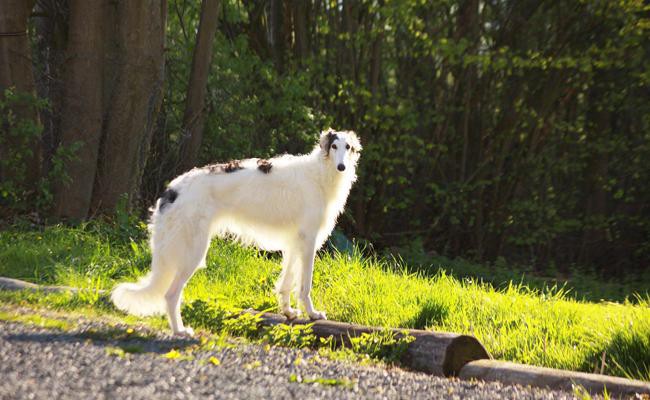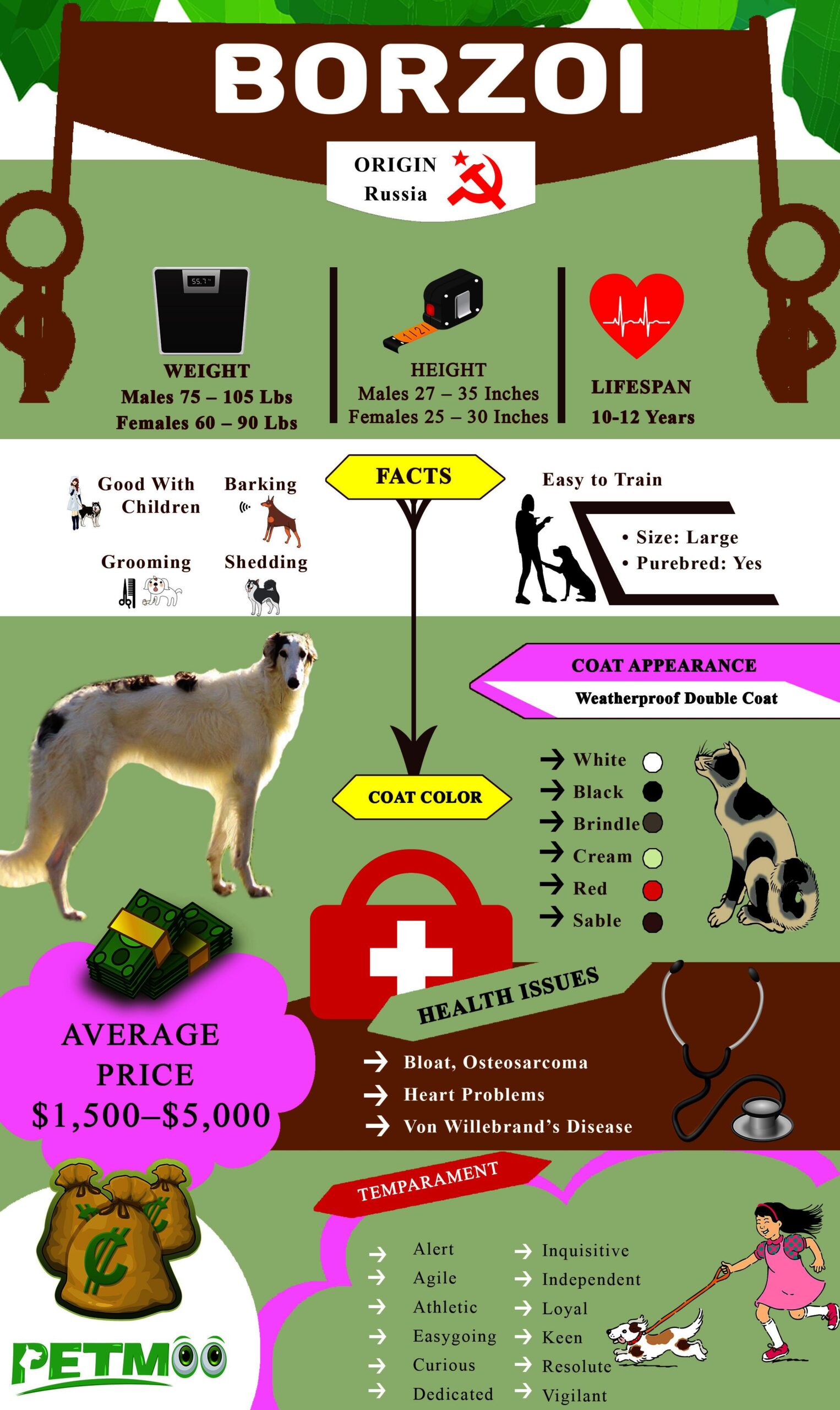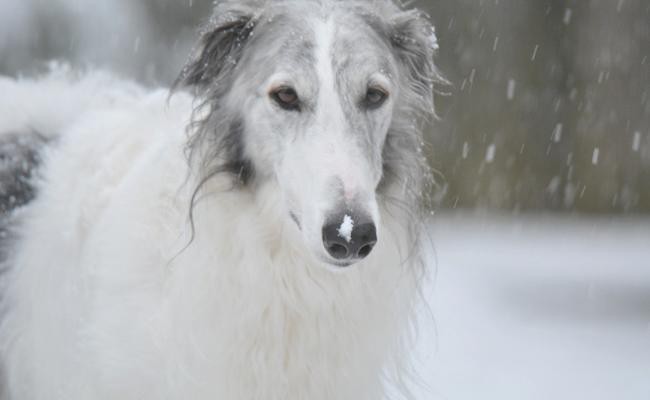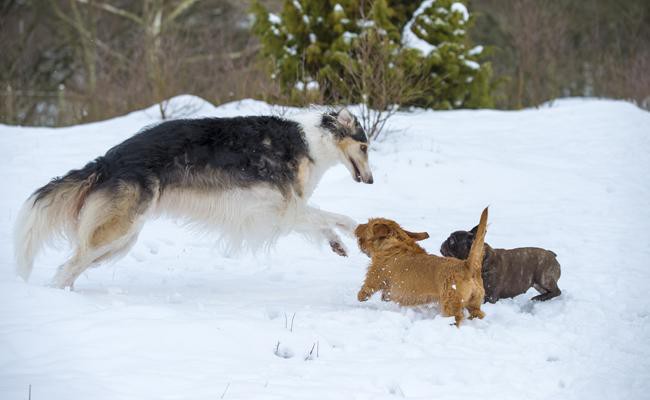Dog Pregnancy Calculator And Timeline
Don’t wink when this dog runs before you or he’ll be gone before you can say “ey, chto eto!” Hey, we’re not kidding. This Russian wolfhound was bred for speed and endurance.
If there are dog Olympics, they would be one of the medal contenders: They are athletic, agile, graceful, and have a striking speed.
Zero to 150 feet in 2.35 seconds, it can leave a sprinting man standing – except, perhaps for Usain Bolt over a rather short distance!
Launching as if like a canine cannonball, fast starts, tight and smooth turns, abrupt stops, and quick to flash off; you are wrong if you think we are talking of some supercar If a Greyhound is the Bugatti Chiron; an Afghan hound is a Ferrari and then this one is a Lamborghini.
We are talking about one of the purest and oldest dog breeds in the world – the Borzoi aka Russian Wolfhounds.
Borzoi Breed Characteristics
- Origin: Russia
- Size: Large
- Dog Breed Group: Sight Hounds (FCI, UKC)/ Hound (AKC, CKC, KC)
- Purebred: Yes
- Lifespan: 10-12 Years
- Height: Males 70 – 90 Cm(27 – 35 Inches), Females 65 – 75 Cm(25 – 30 Inches)
- Weight: Males 34 – 48 Kg(75-105 Lbs), Females 27 – 41 Kg (60-90 Lbs)
- Coat Appearance: Weatherproof Double Coat
- Coat Colors: White, Black, Brindle, Cream, Red, Sable
- Temperament: Alert, Agile, Athletic, Easygoing, Curious, Dedicated, Hard Working, Intelligent, Inquisitive, Independent, Loyal, Keen, Resolute, Vigilant
- Good With Children: Yes
- Intelligence Level: High
- Good With Pets: Yes
- Hypoallergenic: No
- Grooming: High
- Shedding: High
- Barking: Barks When Necessary
- Suitable For Apartments: No
- Need For Exercise: Average
- Easy To Train: No
- Good For First Time Owners: Yes
- Health Issues: Bloat, Osteosarcoma, Heart Problems, Von Willebrand’s Disease
- Litter Size: 8-10 Puppies
- Average Price: 1500 – $2000 USD (USA), £700 For KC Registered, £380 For Non-KC Registered
Borzoi History
If the Afghan hound is the canine aristocrat of the mountains, Saluki is of the deserts and then the Borzoi is the canine aristocrat of the snowy habitat and steppes.
There are many theories regarding the origin of Borzoi in the early seventeenth century. One of the Russian dukes, who liked very fast dogs for hunting imported a number of Arabian Greyhounds and carefully crossed them with a native Russian breed somewhat similar to the Collie of today.
Somewhat more robust and different in build is said to have resulted in the refined, elegant, and aristocratic dog we know as our own Borzoi.
Most of the canine historians agree that all breeds of Russian Borzoi originated from one common root: but that common link is still in speculation.
An old book published in Moscow in 1892 – The Hunter’s Calendar and Reference Book, divides the Borzoi into four groups:
- The Russian or Psovoy Borzoi- having a longer coat
- The Asiatic Borzoi has droopy ears
- The Horton Borzoi has a soft, silky coat
- The Brudastoy Borzoi has a coarse or wire-haired coat
The Russian Revolution almost propelled the breed to extinction and later when the Communists took over.
Several Russian aristocrats euthanized their dearly loved dogs, themselves, before letting the dogs fall into fierce communist hands.
An unknown number of Borzois somehow survived in remote villages and rural countryside. Constantin Esmont, a Soviet soldier, stumbled upon these dogs in the countryside and was impressed in the 1940s.
He photographically recorded them and sent them to Soviet authorities. He persuaded the authorities that the Borzoi was worth saving if there was no other reason than at least, they would be useful to control predator populations that threatened livestock.
The first Borzoi to the United States was not from Russia and it came from England in the 1880s. The AKC officially recognized the breed in 1891 and the Borzoi Club of America was founded in 1903 as the “Russian Wolfhound Club of America.”
Is Borzoi, The Right Dog For You?
If you want a dog who…
- Is tall and slender with an elegant build
- Is extremely agile and athletic – can run swiftly and jump great heights
- Is calm, dignified, and usually gentle with people
- Has a silky coat that comes in many colors
- As an adult, is well-mannered and easygoing in the home
- Doesn’t bark much
A Russian wolfhound may be right for you.
If you don’t want to deal with…
- Providing a highly fenced or enclosed area where he can gallop
- Suspiciousness or Shyness when not properly socialized
- Stubbornness and An independent “what’s in it for me?” attitude toward training
- Strong prey drive to chase other small creatures that run
- Heavy shedding
A Russian wolfhound may not be right for you.
Borzoi Size
Borzoi dogs are large, elegant creatures with a slender and athletic build. Males typically stand between 28 and 32 inches at the shoulder, while females are slightly smaller, ranging from 26 to 30 inches.
Adult Borzois can weigh anywhere from 60 to 105 pounds, with males being larger and heavier than females.
Borzoi Lifespan
On average, Borzoi dogs have a lifespan of 10 to 12 years. However, with proper care, nutrition, and regular veterinary check-ups, some Borzois have been known to live well into their mid-teens.
Like all dogs, the lifespan of a Borzoi can be influenced by various factors, including genetics, diet, exercise, and overall health care.
Borzoi Color
All the accepted coat colors of major kennel clubs are:
Black, Brindle, Black & White, Black Brindle, Black Sable, Blue, Blue Brindle, Blue & White, Blue Sable, Cream, Cream Brindle, Cream & White, Cream Sable, Fawn & White, Fawn Brindle, Fawn Sable, Gold Brindle, Gold & White, Gold Sable, Grey, Grey & White, Grey Brindle, Grey Sable, Lemon, Lemon Brindle, Lemon & White, Mahogany, Mahogany Sable, Mahogany & White, Mahogany Brindle & White, Red & White, Red, Red Brindle, Red Sable, Red Sable & White, Self-Black, Self-Gold, Self-Fawn, Self-Red, Silver, Sable, Silver & White, Silver Brindle, Silver Sable, Tortoiseshell, Tortoiseshell & White, Tricolor, White, White & Black, White & Blue, White & Brindle, White & Cream, White & Fawn, White & Gold, White & Grey, White & Lemon, White & Mahogany, White & Silver Sable, White & Red, White & Red Sable, White & Sable, White & Tortoiseshell, White & Silver, Wolf Sable
Different Types Of Borzoi Coats
There are different types of coats:
- Long-haired Psovoy Borzoi – Longer outer coat, long hair in the neck forms frills, in the hind paws (fringes and culottes). The long hair on the tail is well-covered on all sides, making it dense and bushy
- Soft-haired Hortoy Borzoi – Covered with a relatively short, dense coat, without a ruff, without fringes, without culottes however there is feathering in the tail
- Brudastoy Borzoi has a coarse or wire-haired coat
- Intermediate type or temporary variations – There are so many variations due to the geographic diversity of Russia. Long-haired or silky-haired with/without, fringes, culottes, or feathering
Borzoi Appearance
Borzoi Face
They have a long, narrow, slightly domed, finely chiseled head. The length and width of the head should be in proportion to the length and slenderness of the bones as well as the length and width of the body.
The length of the muzzle is slightly longer than the cranium. The striking aspect is the forehead-nose profile forms an obtuse angle at the eyebrows due to the missing stop.
The forehead is slightly receding towards the back, flat and narrow with a well-pronounced occiput. The long, Strong, narrow, muzzle is of slight depth and is Roman-nosed (with a very slight arch) just before the nose.
Their almond-shaped eyes have a pleasing dark chestnut brown color on the iris. They are fairly close together with gentle but chirpy expressions.
The eyes are frontally placed on the head which gives them a 270-degree field of sight (that’s pretty impressive when compared to the human’s 180 degrees).
They have dry, thin-skinned, tight lips with black pigmented edges, regardless of the color of the coat. Medium-sized, pendant ears when in repose – rest back on the neckline with the tips nearly touching behind the occiput; when at attention- ears are raised.
Borzoi Long Nose
The Borzoi is known for its long, elegant nose, which is one of its distinguishing features. This elongated snout not only adds to the breed’s regal appearance but also serves a functional purpose.
The long nose allows Borzois to have an excellent sense of smell, aiding them in their hunting heritage. It helps them track scents and detect prey, making them skilled hunters and sighthounds.
The long nose is a characteristic that adds to the grace and allure of this magnificent breed.
Borzoi Skull
The Borzoi skull is characterized by its long and narrow structure. It features a gently sloping forehead and a well-defined occiput at the back.
The skull is relatively flat and broad between the ears, gradually tapering towards the muzzle. The skull’s shape allows for ample space for the brain and supports the breed’s keen sense of sight and scent.
Borzois have a distinctively elegant and aristocratic head, with the skull playing a significant role in their overall appearance and breed standard.
Borzoi Mix
- Borzoi-German Shepherd Mix (Borzoi Shepherd): This mix combines the elegance of the Borzoi with the intelligence and loyalty of the German Shepherd. Expect a graceful and agile dog with a protective nature and a strong herding instinct.
- Borzoi-Labrador Retriever Mix (Borzador): This blend brings together the Borzoi’s gracefulness with the Labrador Retriever’s friendly and outgoing personality. The result is a loving and sociable companion with a playful spirit and a willingness to please.
- Borzoi-Greyhound Mix (Borzoi Hound): Combining two sighthound breeds, this mix results in a sleek and athletic dog with exceptional speed and agility. Expect a gentle and affectionate companion who loves to sprint and has a keen eye for chasing prey.
- Borzoi-Border Collie Mix (Borzollie): This mix blends the elegance of the Borzoi with the Border Collie’s intelligence and herding skills. The result is a highly trainable and energetic dog that excels in various dog sports and is devoted to its family.
- Borzoi-Boxer Mix (Borbox): This mix combines Borzoi’s regal appearance with the Boxer’s playful and energetic nature. Expect a dog that is both dignified and fun-loving, with a strong protective instinct and a natural talent for agility and obedience training.
- Borzoi-Golden Retriever Mix (Borzoi Retriever): This mix brings together Borzoi’s elegance with the Golden Retriever’s friendly and gentle temperament. Expect a loyal and affectionate companion who loves to retrieve and is great with children and other pets.
- Borzoi-Siberian Husky Mix (Borzoi Husky): This mix combines the beauty of the Borzoi with the endurance and independence of the Siberian Husky. Expect a dog with a striking appearance, a strong prey drive, and a need for ample exercise and mental stimulation.
- Borzoi Chihuahua Mix (Borzhuahua): This unique mix combines the grace of a Borzoi with the spunk of a Chihuahua. Expect a small to medium-sized dog with a mix of elegant and compact features, a lively personality, and a loving nature.
Borzoi Personality
- Gentle Giants: Borzois are known for their gentle and mild-mannered temperament. They are generally calm, patient, and well-behaved dogs.
- Reserved with Strangers: Borzois can be somewhat aloof and reserved around strangers. They may take some time to warm up to new people and prefer to observe from a distance.
- Sighthound Sensitivity: Being sighthounds, Borzois have a strong prey drive and may have a tendency to chase small animals. It’s important to keep them on a leash or in a secure, fenced area.
- Affectionate Companions: Despite their reserved nature, Borzois form deep bonds with their families. They are loyal and affectionate companions, often enjoying cuddle sessions with their loved ones.
- Independent Thinkers: Borzois are intelligent dogs with a touch of independence. They may not always be eager to please, so consistent and patient training methods are essential.
- Good with Children: Borzois are generally good with children, but due to their large size, supervision is recommended to prevent accidental knocks or falls.
- Peaceful Coexistence: Borzois tend to get along well with other dogs, particularly if they are properly socialized from a young age. However, their prey drive may make them less compatible with smaller pets.
- Moderate Exercise Needs: Despite their athletic build, Borzois are not overly demanding in terms of exercise. They enjoy daily walks and a chance to stretch their legs, but they are generally content with a moderate activity level.
- Serene Demeanor: Borzois are known for their regal and dignified presence. They have a serene demeanor that adds to their allure and makes them a joy to have around.
- Quiet and Gentle: Borzois are not known for excessive barking. They are generally quiet dogs who prefer to observe and take in their surroundings with a gentle and watchful nature.
Who Gets Along With Borzoi Dogs?
- Family with older kids
- Active household
- Houses with large yards, farms, or country houses
- Folks who are on the move, looking for camping or hiking companions.
Adaptability
- Apartment Living – No
- Good For First-Time Owners – Yes
- Sensitivity Level – Average
- Loneliness – Good
- Cold Weather – Very Good
- Hot Weather – Low
Friendliness
- With Family – High
- With Kids – High
- With Other Dogs – High
- With Cats – Good, If Raised Together
- Strangers – Friendly
General Behavior
- Independence – High
- Dominance – High
- Combativeness – Bit Aggressive
- Indoors – Moderately Active
- Outdoor – Highly Active
- Territorial – Yes
- Easy Of Transportation – Good
Borzoi Training
- Trainability – Difficult
- Intelligence – High
- Memory – High
- Mouthiness – High
- Prey Drive: High
- Barking – Average
- Wanderlust Potential – Low
Key factors to consider while training Borzoi dog:
- Training will not be too difficult if it is started at a very young age, but you must be determined. They are also not so difficult to housebreak. The later you start training, the more resistance you’ll experience, as is the case with all dogs.
- Borzoi does not generally fit into high-energy dogs’ brackets and activity levels also vary among individuals. Some are lazy and must be taken for a walk while others will exercise themselves if turned out into a yard.
- Most Borzois will be contented with a 15-30-minute walk daily and the occasional opportunity to romp full out in a securely fenced area.
- Basically, they are sight hounds, born to chase, and they’ll pursue anything that’s moving, they don’t bother even if that means running opposite a truck. Play times in a safely fenced area or Walks on a leash are musts for this breed.
- Their genetic memory doesn’t make them hostile towards similar creatures, but still, dogs that are not properly socialized or trained may develop aggression toward other pets/animals.
- Their sheer size and speed make them risky if they don’t know how to interact with them.
- Borzois have minds of their own – Just like all hounds with a hunting heritage and that doesn’t make training easy. People who don’t know the breed may brand them dumb.
- They’re stubborn, fair enough, but they’re not dumb. During training, the dogs will be probing whether they want to do what you’ve asked and in that case, what’s in it for them.
- They quickly become uninterested in repetitive training, so keep training sessions short and sweet. The key to successfully training a Borzoi is constant positive reinforcement and training through threats will never work.
Borzoi Dog Care
- Exercise Needs – Average
- Intensity – Average
- Activity Level – Medium
- Exercise Requirements – >60 Minutes/Day
- Walk Mileage/Week – 10 Miles
- Playfulness – Low
- Grooming Needs – High
- Tendency To Drool – Low
- Snore – Low
- To Bark – When Required
- Dig – Low
- Social/Attention Needs – Average
1. Regular Exercise: Despite their calm nature, Borzois still require regular exercise to keep them healthy and happy. Aim for daily walks and provide opportunities for them to stretch their legs in a secure, fenced area.
2. Proper Nutrition: Feed your Borzoi a balanced diet that meets their nutritional needs. Consult with your veterinarian to determine the appropriate portion sizes and choose a high-quality dog food that suits their age, size, and activity level.
3. Grooming Routine: Brush your Borzoi’s coat at least once a week to prevent matting and keep their fur looking its best. During shedding seasons, more frequent brushing may be necessary. Regularly check their ears, trim their nails, and brush their teeth for overall grooming maintenance.
4. Socialization: Start socializing your Borzoi from an early age. Expose them to various people, animals, and environments to help them develop good social skills and confidence.
5. Training and Mental Stimulation: Borzois are intelligent dogs that benefit from mental stimulation. Engage them in obedience training, interactive games, and puzzle toys to keep their minds sharp and prevent boredom.
6. Regular Veterinary Care: Schedule regular check-ups with your veterinarian to monitor your Borzoi’s health, administer vaccinations, and address any potential issues promptly. Stay up to date on parasite prevention, such as flea and tick control.
7. Safety Measures: Borzois have a prey drive, so ensure they are always on a leash or in a securely fenced area when outside. Protect them from extreme temperatures, as they are more sensitive to heat than cold.
8. Love and Attention: Borzois thrive on love and attention from their owners. Spend quality time with them, provide plenty of affection, and create a nurturing and loving environment for them to flourish.
9. Mental Health: Borzois are sensitive souls, so ensure they have a comfortable and peaceful living environment. Avoid harsh training methods or environments that could cause undue stress or anxiety.
10. Regular Dental Care: Brush your Borzoi’s teeth regularly to maintain good oral hygiene and prevent dental issues. Use a dog-specific toothbrush and toothpaste recommended by your veterinarian.
Borzoi Food
- High-Quality Dog Food: Choose a premium dog food brand that offers balanced nutrition for large breeds. Look for options with real meat as the first ingredient, avoiding fillers and artificial additives.
- Adequate Protein: Borzois require a diet rich in protein to support their muscle development and overall health. Ensure that the dog food you choose contains a sufficient amount of high-quality animal protein.
- Controlled Portion Sizes: Due to potential weight gain, it’s important to monitor portion sizes and avoid overfeeding. Consult with your veterinarian to determine the appropriate amount of food based on your dog’s age, activity level, and weight.
- Joint Health Support: Borzois are prone to joint issues, so consider a dog food formula that includes glucosamine and chondroitin to support joint health and mobility.
- Mindful Treats: When giving treats, choose healthy options that complement your dog’s diet. Avoid excessive treats to prevent weight gain and maintain a balanced nutritional intake.
- Hydration: Ensure your Borzoi has access to fresh, clean water at all times. Stay mindful of their water intake, especially during hot weather or after exercise.
- Dietary Sensitivities: Some Borzois may have food allergies or sensitivities. Monitor your dog’s reaction to certain ingredients and consult with your veterinarian if you suspect any dietary issues.
- Feeding Schedule: Establish a consistent feeding schedule to maintain healthy digestion and prevent bloating. Divide your Borzoi’s daily food intake into two or three meals, following a routine that works best for your dog.
Borzoi Grooming
- Coat Density – Dense
- Coat Length – Long Or Short
- Coat Texture – Straight, Wavy Or Curly
- Brushing Frequency – Weekly
- Trimming/Stripping – No
- Hypoallergenic – No
- Shedding – High
The Borzois have a lot of furs, thanks to his profuse double coat. They are of high maintenance when it comes to keeping their coats looking good and tangle-free.
They shed a tremendous amount during shedding seasons when more frequent grooming is an absolute necessity.
During the rest of the year, they shed minimally, it is much less but still, they still need to be brushed frequently to stay on top of things, especially as they are large dogs.
The good news is, though, they do not need any sort of specialist grooming.
Brush your dog with a wire slicker brush one to two times a week in order to get rid of loose and fallen hair. Make sure to check for mats or tangles in the place where the coat is heaviest – in the mane, breeches, and tail.
Borzoi Puppies Names
Borzoi Male Puppy Names
- Andros
- Austin
- Boris
- Damir
- Fyodor
- Igor
- Maks
- Kervin
- Maverick
- Samson
Borzoi Female Puppy Names
- Anya
- Eva
- Galina
- Fido
- Ivanna
- Natalya
- Olga
- Raiza
- Samara
- Sasha
Borzoi Health Problems
While generally a healthy breed, Borzois can be prone to certain health issues. One common concern is bloat, a potentially life-threatening condition characterized by the twisting of the stomach.
Owners should be cautious about feeding their Borzoi large meals and ensure they do not engage in vigorous exercise immediately after eating.
Other health issues that may affect the breed include hip dysplasia, progressive retinal atrophy (PRA), and thyroid disorders. Responsible breeders perform health screenings on their breeding dogs to minimize the risk of passing on these conditions.
Borzoi Price
The cost of a Borzoi puppy can vary depending on several factors, including the reputation of the breeder, the lineage of the puppy, and the geographic location.
On average, you can expect to pay anywhere from $1,500 to $3,000 for a Borzoi puppy from a reputable breeder. It’s important to be cautious of extremely low-priced puppies, as they may come from irresponsible breeders or puppy mills.
Additionally, potential owners should consider the ongoing expenses of owning a dog, including food, grooming, veterinary care, and training.
Borzoi Breeders
When searching for a Borzoi puppy, it’s crucial to find a reputable breeder who prioritizes the health and well-being of the dogs.
A responsible breeder will perform health screenings on their breeding dogs, provide proper socialization for the puppies, and offer support and guidance to new owners.
Borzoi Rescue
Borzoi rescue organizations are dedicated to finding loving homes for Borzois in need. These organizations rescue Borzois from shelters, abusive situations, or owners who can no longer care for them.
They provide medical care, rehabilitation, and foster homes for these dogs until suitable forever homes are found. Borzoi rescue groups also educate the public about the breed and promote responsible ownership.
Adopting a rescued Borzoi not only gives a deserving dog a second chance at life but also brings immense joy and fulfillment to the adopter.

Click here to find Borzoi breeders in the USA.

